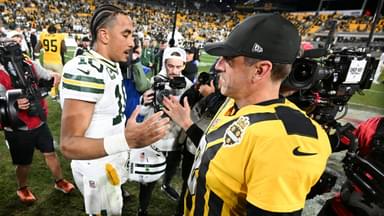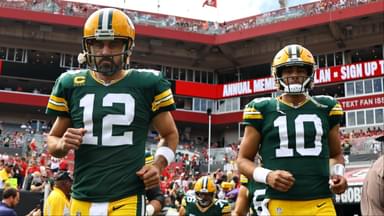After a couple of tumultuous seasons with the New York Jets, Aaron Rodgers is all but set to end his storied NFL career with his former Super Bowl rivals, the Pittsburgh Steelers. The 2025 regular season will be the 21st of Rodgers’ career, and he figures to make one last bit of history before bowing out for good.
Advertisement
For better or worse, parallels were often drawn between Rodgers and his predecessor, Brett Favre, ever since he took over in Green Bay way back in 2008. Now, nearly two decades later, Rodgers is set to pass Favre in the all-time passing touchdown race.
From 1992 to 2010, Favre managed to produce 508 passing touchdowns, the fourth most of any quarterback in NFL history. Rodgers sits at a current career total of 503, the fifth most in NFL history.
Rodgers has a career average of 34 passing touchdowns per 17 games, or two touchdowns per contest. He’s currently projected to surpass Favre in the all-time standings during the Steelers’ Week 3 showcase against the New England Patriots in Foxboro.
From Green Bay to New York, there’s certainly no shortage of overlaps between the careers of Rodgers and Favre. Despite their shared origins, however, the relationship between them is nowhere near as close as their stat totals.
After Rodgers was initially drafted by the Packers in 2005, Favre infamously proclaimed that “My contract doesn’t say I have to get Aaron Rodgers ready to play.” The two of them have been somewhat at odds ever since.
Although he’s essentially guaranteed to usurp Favre in 2025, it does seem rather unlikely that Rodgers will be able to catch up to the likes of his other contemporaries when it comes to passing touchdowns. Peyton Manning slots ahead of him with 539 career passing TDs, and the next two appear to be far from reach.
The pride and joy of the New Orleans Saints, Drew Brees, has the second-most touchdown passes of any quarterback with 571. The all-time king of touchdown passes, Tom Brady, sits comfortably atop the rankings with 649 passing touchdowns.
Even if Rodgers were able to maintain his current averages, it would still take him more than two seasons to surpass the likes of Manning and Brees. As far as Brady is concerned, his records remain untouchable.
Rodgers may not be better than Brady or Brees, nor has he maintained the best of relationships with his former mentor, Favre. But he still boasts one of the most decorated resumes of any signal caller in gridiron history.
If it’s all the same, then he’ll surely be cherished by a Pittsburgh fan base that has had to suffer through uninspiring quarterback play for the last five seasons.







